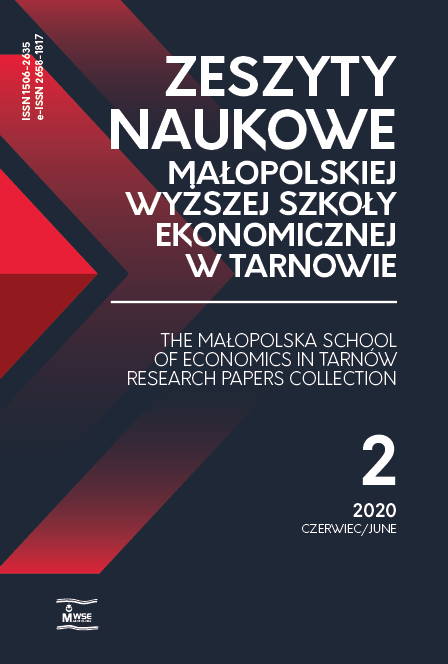Abstract
The motive for choosing the topic in the presented article is the deep dichotomy between prosperity and poverty that still exists in the modern world. After World War II, this problem did not decrease, given the clear economic, social and political division into highly-, medium- and under-developed countries. The latter in the UN nomenclature are described as “developing” rather than the previously used name: Third World countries. The main aim of the study is to indicate the scientific achievements in these areas of Nobel Prize winners affecting welfare policy and eradication of poverty within the dynamically developing “welfare economics”. Considerations in this regard—in a reasoned way—are preceded by a discussion of the population theory of T. R. Malthus, as well as a presentation of income disparities in the light of the theory of distribution. Even before World War II, the authors V. Pareto, A. C. Pigou and A. Bergson made achievements in analyzing welfare economics in pioneering theoretical studies. Contemporary research on these topics is also presented, which was carried out by last year’s Nobel Prize winners E. Duflo, A. Banerjee and M. R. Kremer dealing with the economics of the development of the poorest countries. An outline of the welfare state concept adopted after World War II in some Western countries is presented. Welfare policy and eradication of poverty in the poorest countries is described, based largely on the results of research by Nobel Prize winners.
References
Arrow Kenneth Joseph. (2001). In: J. Wojnowski (ed.). Wielka encyklopedia PWN. Vol. 2. Analiza naprężeń – azerbejdżański język (p. 331). Warszawa: Wydawnictwo Naukowe PWN. ISBN 8301134097.
View in Google Scholar
Begg, D., Fisher, S., Dornbusch, R. (1993). Ekonomia. Vol. 1. Transl. by B. Czarny [et al.]. Warszawa: Polskie Wydawnictwo Ekonomiczne. ISBN 8320809231.
View in Google Scholar
Blaug, M. (1994). Teoria ekonomii. Ujęcie retrospektywne. Transl. by I. Budzyńska. Warszawa: Wydawnictwo Naukowe PWN. ISBN 8301105429.
View in Google Scholar
Buttler, D. (2020). Szczepienie soczewicą. Polityka, 6, 40.
View in Google Scholar
Drabińska, D. (2002a). Debreu. In: J. Wojnowski (ed.). Wielka encyklopedia PWN. Vol. 6. Chucyjew – Dechepare (p. 571). Warszawa: Wydawnictwo Naukowe PWN. ISBN 8301134445.
View in Google Scholar
Drabińska, D. (2002b). Dobrobytu ekonomia. In: J. Wojnowski (ed.). Wielka encyklopedia PWN. Vol. 7. De Chirico – Dżamadat Nasr (pp. 234–235). Warszawa: Wydawnictwo Naukowe PWN. ISBN 8301135905.
View in Google Scholar
Drabińska, D. (2004). Sen. In: J. Wojnowski (ed.). Wielka encyklopedia PWN. Vol. 24. Rozwadowski – sfyrelaton (p. 519). Warszawa: Wydawnictwo Naukowe PWN. ISBN 8301141921.
View in Google Scholar
Duignan, B. (2019). Michael Kremer: American economist [online, accessed: 2019-11-08]. In: Encyclopedia Britannica. Retrieved from: https://www.britannica.com/biography/Michael-Kremer.
View in Google Scholar
Kłobukowska, J. (2013). Laureaci Nagrody Nobla w dziedzinie nauk ekonomicznych. Historia i wkład do współczesnej myśli ekonomicznej. Optimum. Studia Ekonomiczne, 4, 144–155.
View in Google Scholar
Malthus, T. R. (1925). Prawo ludności. Transl. by K. Stein. Warszawa: nakład Gebethnera i Wolffa. (Kraków: Druk W. L. Anczyca i Spółki).
View in Google Scholar
Milewski, R., Kwiatkowski, E. (eds.). (2005). Podstawy ekonomii. Warszawa: Wydawnictwo Naukowe PWN. ISBN 8301144246.
View in Google Scholar
Nobel dla badacza ubóstwa i dobrobytu. (2015). Rzeczpospolita, 2402 (2015-10-13).
View in Google Scholar
Pawłowski, W. (2020). Indian dream. Polityka, 4(3245), 92.
View in Google Scholar
Samuelson, P. A., Nordhaus, W. (1996). Ekonomia. Vol. 2. Transl. by J. Kochanowicz. Warszawa: Wydawnictwo Naukowe PWN. ISBN 8301119063.
View in Google Scholar
Siekierski, J. (2010). Wkład laureatów Nagrody Nobla w dziedzinie ekonomii w rozwój nauk ekonomiczno-rolniczych. In: J. Siekierski. Rolnictwo i wieś przed i po akcesji Polski do Unii Europejskiej (pp. 368–376). Kraków: Wydawnictwo Uniwersytetu Rolniczego. ISBN 9788360633366.
View in Google Scholar
Siekierski, J., (2012). Nobliści w dziedzinie ekonomii o cyklach i kryzysach gospodarczych. Zeszyty Naukowe Małopolskiej Wyższej Szkoły Ekonomicznej w Tarnowie, 20(1), 149–166. DOI: 10.25944/znmwse.2012.01.149166.
View in Google Scholar
Siekierski, J., Sarat, S. (2006). Metody ilościowe w badaniach laureatów nagrody im. Alfreda Nobla w dziedzinie ekonomii. Acta Agraria at Silvestria. Series Agraria, 47, 387–396.
View in Google Scholar
Smith, A. (1954). Badania nad naturą i przyczynami bogactwa narodów. Vol. 1. Transl. by G. Wolff, O. Einfeld. Warszawa: Państwowe Wydawnictwo Naukowe.
View in Google Scholar
Szewioła, P. (2020). Coraz więcej emerytów jest aktywnych zawodowo. Dziennik Gazeta Prawna, 32(5185), February.
View in Google Scholar
Taylor, E. (1991). Historia rozwoju ekonomiki. Vol. 2. Lublin: Wydawnictwo Delfin. ISBN 8385454039.
View in Google Scholar
Wikipedia. (2015). Angus Deaton [online, accessed: 2015-10-14]. In: Wikipedia. Wolna encyklopedia. Retrieved from: https://pl.wikipedia.org/wiki/Angus_Deaton.
View in Google Scholar
Wikipedia. (2019a). Abhijit Banerjee [online, accessed: 2019-10-30]. In: Wikipedia. Wolna encyklopedia. Retrieved from: https://pl.wikipedia.org/wiki/Abhijit_Banerjee.
View in Google Scholar
Wikipedia. (2019b). Esther Duflo [online, accessed: 2019-10-26]. In: Wikipedia. Wolna encyklopedia. Retrieved from: https://pl.wikipedia.org/wiki/Esther_Duflo
View in Google Scholar

This work is licensed under a Creative Commons Attribution-NonCommercial-NoDerivatives 4.0 International License.

